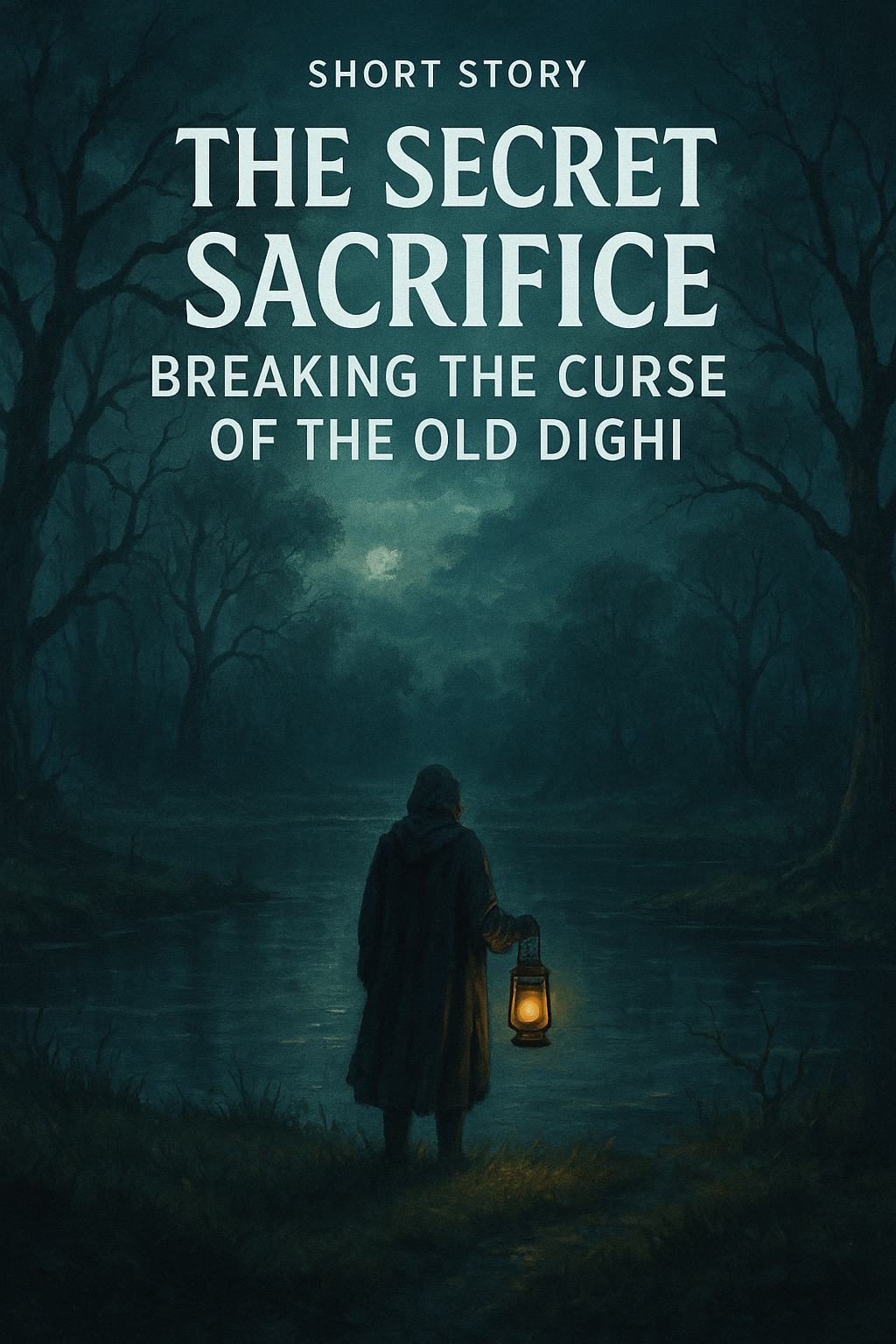This story is set in Jagannathpur, Sylhet, Bangladesh.
The sun-drenched village of Kishorepur, located in Jagannathpur, Sylhet, bustled with life as the Takur family, descendants of Jagannath the Zamindar, went about their daily routines. Surrounded by lush green fields and fragrant mango orchards, the family relished the simplicity and tranquility of their existence, relying on their own lands for sustenance as their wealth had diminished through the generations.
But their peaceful life took an intriguing turn when they discovered a peculiar occurrence near the village—an Old Dighi, a serene pond nestled amidst the verdant landscape. This ancient Dighi held within it a mysterious secret that would captivate their hearts and minds.
Each morning, as the first rays of sunlight delicately kissed the water’s surface, the Takur family witnessed a breathtaking sight. Golden cooking pots, adorned with intricate designs, emerged from the depths of the Old Dighi, shimmering in the gentle sunlight. Floating effortlessly, they seemed to possess an ethereal quality, enchanting the family with their mesmerizing beauty.
As the day progressed, the golden pots gracefully descended back into the water’s embrace, disappearing until the next morning’s arrival. This recurring phenomenon both fascinated and puzzled the Takur family, igniting a burning curiosity within them.
Whispers echoed through the village, as neighbors and friends marveled at the enigmatic spectacle. Speculations about the origin and significance of these ethereal vessels abounded. Some attributed it to a divine blessing, while others believed it to be the work of mystical forces lurking within the depths of the ancient dighi.
Intrigued by this mysterious occurrence, the Takur family’s thirst for understanding grew with each passing day. They would gather by the edge of the Old Dighi, their eyes wide with wonder, observing as the golden pots rose and sank like apparitions from a realm beyond. Conversations centered around the Old Dighi and its inexplicable treasures, fueling their determination to unravel the enigma that held them in its grip.
Weeks turned into months, and the Takur family’s quest for answers only deepened. They delved into ancient texts, scouring the pages for references to similar phenomena, hoping to shed light on the mystery that had captured their hearts. Yet, despite their efforts, the secret of the Old Dighi and its golden pots remained elusive, casting a spell of fascination and intrigue over the family’s lives.
Word of the Takur family’s fascination with the golden pots and their burning desire to uncover the truth reached the ears of the village elders, who whispered a single name in response: Rishi Abindonath. This revered sage hailed from the distant village of Rangaping in Golapgonj, renowned for his spiritual prowess and deep connection with the mystical realms. His name itself bore the gravitas of wisdom and enlightenment, establishing him as a luminous beacon of hope for those seeking spiritual guidance. There was a pervasive belief that he possessed the extraordinary capability to commune with spirits and unveil the mysteries of the hidden realm.
Filled with resolute determination, the Takur family set out on a pilgrimage to Rangaping, leaving behind the familiarity of their village and embarking on a journey fraught with anticipation and trepidation. As they arrived in Rangaping, a village steeped in ancient traditions and surrounded by majestic temples, they felt an overwhelming sense of awe and reverence. The air itself seemed charged with spiritual energy, and the bustling streets carried whispers of Rishi Abindonath’s profound wisdom.
Navigating the winding paths, the Takur family made their way towards the ashram where Rishi Abindonath resided. Their footsteps echoed in unison, their hearts beating in synchrony, as they ventured closer to the sage who held the potential to unlock the mysteries of the Old Dighi.
Finally reaching the ashram, they were greeted by a humble abode surrounded by lush gardens and adorned with vibrant flowers. Rishi Abindonath, a figure emanating serene composure and spiritual radiance, welcomed the Takur family with a warm smile that seemed to convey both understanding and reassurance.
In the presence of Rishi Abindonath, a deep sense of tranquility and reverence enveloped the Takur family. They shared their tale of the golden pots, their bewilderment, and their burning yearning for understanding. Their words flowed with a mixture of hope and humility, as they implored the sage for his invaluable assistance.
Rishi Abindonath listened intently, his eyes shimmering with the ancient wisdom accumulated over his years of spiritual practice. He nodded, fully comprehending the weight of the Takur family’s quest and the profound significance it held for them.
In a voice that resonated with profound calmness, Rishi Abindonath reassured them. He acknowledged their sincerity and affirmed his commitment to utilizing his spiritual abilities to delve deep into the secrets of the Old Dighi. His reputation as a powerful and knowledgeable guide instilled a renewed sense of hope within the hearts of the Takur family, reigniting their faith that answers were within reach.
The anticipation within the Takur family grew with each passing moment as they awaited Rishi Abindonath’s investigation into the mysteries surrounding the old dighi. Within a secluded chamber in the ashram, the revered sage immersed himself in deep meditation, forging a spiritual connection to the ethereal realm that governed the enigmatic pond.
Days melded into nights as Rishi Abindonath delved deeper into a profound state of introspection, communing with the spiritual forces at play. His unwavering dedication and profound knowledge allowed him to bridge the gap between the mortal realm and the divine.
In the depths of his meditation, Rishi Abindonath established a communion with the spirit residing within the Old Dighi. Through the ethereal whispers that danced within the silence of his mind, he unraveled the essence of the golden pots and their purpose.
Emerging from his meditative trance, Rishi Abindonath’s countenance radiated serenity, his eyes gleaming with an otherworldly glow. The Takur family, eager for answers, gathered around him, their faces alight with hope and anticipation.
With a voice that blended profound wisdom and compassion, Rishi Abindonath unveiled the hidden truth. He explained that the golden pots were indeed a divine manifestation, a blessing bestowed upon them from the realm of spirits residing within the Old Dighi. However, their acquisition came with a profound condition, one that would test the very foundations of the Takur family.
To obtain the solid gold cooking pots, Rishi Abindonath conveyed the spirit’s demand: the Takur family must offer an unmarried girl from their own lineage to the Old Dighi. It was a weighty sacrifice, an offering that would forever alter the course of their family’s destiny.
A profound silence enveloped the room as the weight of the condition settled upon the Takur family. They exchanged glances, their faces etched with a mixture of awe, hesitation, and concern. The sacred bond of family, their deeply held values, and the societal implications weighed heavily on their hearts.
Recognizing the gravity of the situation, Rishi Abindonath empathized with the family’s struggle. He assured them that the decision rested solely in their hands, emphasizing the importance of honoring their values and traditions. At the same time, he acknowledged the far-reaching consequences of rejecting the spirit’s condition, urging them to carefully consider the path they would choose.
The revelation from Rishi Abindonath weighed heavily upon the Takur family, plunging them into a profound moral dilemma. The condition set by the spirit residing within the Old Dighi—a demand to offer an unmarried girl from their own lineage—clashed with their deeply held cultural and familial values, causing a rift within their very souls.
Gathered together in earnest contemplation, the family engaged in a heartfelt discussion, their voices filled with concern and love for one another. They recognized the significance of the golden pots and the immense wealth they represented. However, the thought of sacrificing a cherished daughter or sister, someone held dear within their family, created a dissonance that reverberated through their beings.
Cultural traditions and the bonds of family held immense importance for the Takur family. The notion of offering an unmarried girl from their own kin to the Old Dighi seemed inconceivable, for it would violate the very essence of their values and moral responsibility. The weight of this decision threatened to tear them apart, as each member grappled with their own internal struggle.
Amidst the emotional turmoil, alternative solutions were considered, each carrying its own set of risks. They entertained the idea of seeking a willing participant from outside the family, someone who might undertake the sacrifice. However, they quickly realized the challenges it posed, with concerns about the impact on the girl’s life and the reverberations it would send throughout the community.
The Takur family understood the gravity of the situation and the far-reaching consequences of their choices. They recognized that their actions would shape the lives of generations to come. While the allure of wealth and prosperity danced tantalizingly in their thoughts, their moral compasses whispered caution, reminding them of the virtues they held dear.
Engulfed in the depths of their moral dilemma, fate guided the Takur family to an unexpected encounter that would forever alter their lives. As they meandered through the bustling paths of Jagannathpur, their path intersected with that of a destitute beggar girl. Clad in tattered clothes and weary-eyed, she bore witness to a life of hardship and struggle.
Moved by a mixture of compassion and desperation, the Takur family approached the beggar girl, sharing a carefully woven tale. They explained that while washing the golden vessels by the Old Dighi, some had accidentally floated away. They depicted the incident as an unfortunate accident, a circumstance outside of their realm of influence. The beggar girl attentively absorbed their words, her eyes widening with a flicker of hope, recognizing it as a potential avenue to break free from her destitution.
The Takur family enticed her with the promise of a significant reward, for the golden vessels held sentimental value to their lineage. They offered her the chance to retrieve the vessels from the Old Dighi, without disclosing the full weight of the sacrifice that lay beneath their proposition. In her vulnerable state, the beggar girl embraced the opportunity, unaware of the intricate web of fate that was about to entangle her life with theirs.
Despite the potential risks and dangers involved, the beggar girl saw this as a transformative opportunity to change her life’s trajectory. Driven by trust in the Takur family and a deep belief that they would honor their word, she willingly agreed to help them retrieve the golden vessels from the Old Dighi.
With trepidation in their hearts, the Takur family guided the beggar girl to the Old Dighi, their hands trembling as they prepared to execute their desperate plan. Anxious eyes watched as she waded into the calm waters, each step carrying the weight of their collective hope.
However, as the beggar girl ventured deeper into the Old Dighi’s depths, an eerie stillness settled over the scene. The air grew heavy with foreboding, and the golden vessels shimmered with an ethereal glow, as if aware of the impending tragedy.
Suddenly, cries for help shattered the tranquility, echoing across the expanse of the Old Dighi. Horror and despair gripped the hearts of the Takur family as they realized the gravity of the situation—the beggar girl had fallen victim to the spirit’s realm, unable to comprehend the true dangers that lurked within the waters.
Each desperate plea for salvation intensified the Takur family’s guilt and grief. The Old Dighi claimed the life of the selfless girl who had entrusted her fate to their hands. Her cries faded into the void, leaving behind a haunting silence that would forever echo in their hearts.
As the lifeless body of the beggar girl sank into the depths of the Old Dighi, a profound silence settled over the Takur family. Their hearts heavy with grief, they witnessed a haunting sight—the golden vessels, once half submerged, miraculously floated to the shore. Released from their ethereal hold, they taunted the family, mocking the tragic turn of events.
Overwhelmed with a mix of relief and disbelief, the Takur family celebrated the arrival of their newfound riches. The golden vessels, gleaming in the sunlight, became symbols of their financial prosperity. They sold the magnificent artifacts, reaping substantial profits that elevated them from their humble lifestyle.
The family’s fortune quickly grew, ushering in a transformation in their lives. Opulent mansions rose, adorned with exquisite jewelry, and they indulged in a life of luxury previously beyond their reach. The village of Kishorepur buzzed with whispers of their success, as the Takur family’s name became synonymous with affluence.
Unbeknownst to the Takur family, the ghost of the Old Dighi, resentful of the tragedy that befell the beggar girl, watched from the ethereal realm. With a voice laced with sorrow and anger, the ghost placed a curse upon the Takur lineage, forever linking the drowning of the beggar girl to the misfortune that would befall the girls from their family after marriage.
The curse unleashed a relentless cascade of misfortunes upon the Takur family, generation after generation. Daughters and sisters within their bloodline suffered through tumultuous marriages, facing a myriad of hardships, heartbreak, and despair. The curse’s clasp grew tighter with the passage of each generation, enveloping the family’s otherwise prosperous existence in a shroud of sorrow and melancholy.
Driven by an unwavering resolve to liberate themselves from the enduring grasp of the ancestral curse, the Takur family embarked on a profound quest for redemption. Their gaze fixed upon the descendants of Rishi Abindonath, they held onto the hope that these successors would possess the vital wisdom and spiritual prowess required to decipher the enigmatic curse that had loomed over their lives, casting a pall of darkness.
The journey to find the present-day successors of Rishi Abindonath was arduous but filled with unwavering determination. The Takur family delved deep into ancient texts and sought counsel from wise sages and scholars who held fragments of information about the lineage they sought. Guided by whispers of history and the flickering hope in their hearts, they traced the intricate thread that connected the past to the present.
Eventually, their search bore fruit, and the Takur family discovered the present-day descendants of Rishi Abindonath. They were a humble and devoted lineage, dedicated to preserving the spiritual wisdom and traditions passed down through the generations. Living in the quiet village of Mayang in Morigaon district, Assam, the descendants upheld their ancestor’s legacy, their lives intertwined with the profound teachings and mystical practices of their forebear.
With hope renewed, the Takur family reached out to the descendants, pouring their hearts into a letter that detailed their plight—the curse that had befallen their lineage, the suffering endured by the girls in their family after marriage, and their desperate plea for assistance. They knew that only these descendants possessed the spiritual prowess necessary to unravel the complexities of the curse and guide them towards redemption.
In their letter, the Takur family expressed their unwavering faith in the ancient wisdom and power that resided within the lineage of Rishi Abindonath. They beseeched the descendants to hear their plea, to acknowledge the shared bond that transcended time and space. They hoped that their earnest words would resonate with the descendants and compel them to offer their aid in breaking the generational curse that had tormented the Takur family.
With a sense of duty and compassion, the descendants of Rishi Abindonath embraced the responsibility of confronting the malevolent spirit and freeing the Takur family from the grip of the generational curse. They understood the gravity of the situation and the transformative power their spiritual guidance held. Determined to bring an end to the cycle of suffering, they prepared themselves for the daunting task that lay ahead—their confrontation with the spirit in the Old Dighi, where the curse originated.
Harnessing the sacred rituals and profound knowledge passed down through their lineage, the descendants embarked on a transformative journey of preparation. They delved deep into ancient texts and scriptures, seeking the wisdom that would enable them to navigate the ethereal realm and negotiate with the vengeful spirit residing within the Old Dighi.
Days turned into nights as the descendants meticulously performed rituals to appease the spirit and seek forgiveness. Their dedication knew no bounds as they offered prayers, conducted sacred fire ceremonies, and immersed themselves in intense meditation to attune their minds and spirits with the ethereal energies at play.
Finally, the long-awaited day arrived—the day when the descendants of Rishi Abindonath would confront the ghost of the Old Dighi and shatter the chains of the generational curse that had plagued the Takur family. Accompanied by the Takur family, whose hearts overflowed with a mix of hope and trepidation, the descendants approached the Old Dighi, standing upon the threshold of both past sorrows and future possibilities.
As the sun sank beneath the horizon, casting long shadows over the still water, a spectral figure emerged from the depths of the Old Dighi. The ghost of the Old Dighi, bearing the weight of anguish and resentment, shimmered with an otherworldly light. The descendants, resolute in their purpose, engaged in a profound dialogue with the spirit, appealing to its innate compassion and yearning for resolution.
Words intertwined with emotions, as the descendants delicately unraveled the story of the beggar girl’s sacrifice, acknowledging the injustice that had befallen her. They expressed remorse on behalf of the Takur family and their deep understanding of the pain inflicted upon her. Through their entwined voices, they sought forgiveness and offered solace for the tragedy that had unfolded.
In a moment of transcendence, the ghost of the Old Dighi, its ethereal form shimmering, acknowledged the descendants’ plea. The spirit, burdened by its own sorrow and anger, recognized the sincere efforts made by the Takur family’s descendants to seek redemption and rectify the past.
With a final sigh that echoed through the depths of the Old Dighi, the spirit released its hold over the Takur family, breaking the chains of the generational curse that had loomed over their lives. A gentle breeze whispered through the surroundings, carrying away the remnants of the curse and heralding a newfound era of liberation and renewal. The Takur family, bathed in the light of forgiveness, embraced this transformative moment as a fresh beginning—an opportunity to rewrite their destiny and pave the way for a future free from the shadow of the Old Dighi’s curse.
With the curse lifted, a wave of relief and hope washed over the Takur family, their hearts unburdened from the weight of generations of suffering. The realization that the curse had finally been broken brought tears of joy to their eyes and an overwhelming sense of gratitude toward the descendants of Rishi Abindonath, whose guidance and intervention had facilitated their liberation.
Gathering together, the Takur family basked in the radiance of their newfound freedom, their spirits rejuvenated and their faith in spirituality renewed. They expressed profound appreciation to the descendants, their words overflowing with gratitude for the transformative power of their wisdom and the selfless dedication with which they had assisted in breaking the ancestral curse. The descendants, humbled by the family’s gratitude, humbly accepted their thanks, emphasizing that it was the collective effort and unwavering belief of the Takur family that had ultimately paved the way for their redemption.
Embracing this profound phase of their existence, the Takur family set forth on a transformative journey of healing and reconstruction. They held dear the invaluable wisdom acquired from their past, acknowledging the significance of empathy, compassion, and the imperative to sever the chains of suffering. Motivated by their own liberation, they aspired to establish a harmonious and nurturing environment for the girls within their lineage, guaranteeing their emancipation from the shackles of the enduring curse that had beset them for countless years.
The family’s revitalized faith in spirituality breathed new life into their everyday existence, endowing it with a profound sense of purpose and an intimate connection to the divine. They embraced rituals and practices that fostered inner peace and deepened their spiritual connection. As they moved forward, they remained mindful of the past, always keeping a watchful eye on the well-being and happiness of the girls in their family, determined to shield them from the dark shadows that had once cast their lives into turmoil.
In the wake of their redemption, the Takur family extended their compassion and support to others facing similar challenges. They became beacons of hope, sharing their story of triumph over adversity and offering solace to those still ensnared by generational curses or personal tribulations. Their own transformative journey had instilled within them a deep sense of empathy, igniting a desire to uplift others and help them find their own path to liberation.
Written by Mujibur Rahman
– The End –
“This is a work of fiction. Names, characters, business, events and incidents are the products of the author’s imagination. Any resemblance to actual persons, living or dead, or actual events is purely coincidental.”
If you enjoyed this short story and want to support my work, click here to buy me a coffee.
Subscribe to my list for valuable updates.
Let me know your thoughts on this short story via the comments section. You can also add your insights and suggestions.
You can support my work by sharing it with others.

Follow My Journey And Get Inspired To Transform Your Life For The Better
“I may earn commissions as an affiliate from sponsored links within this post”





